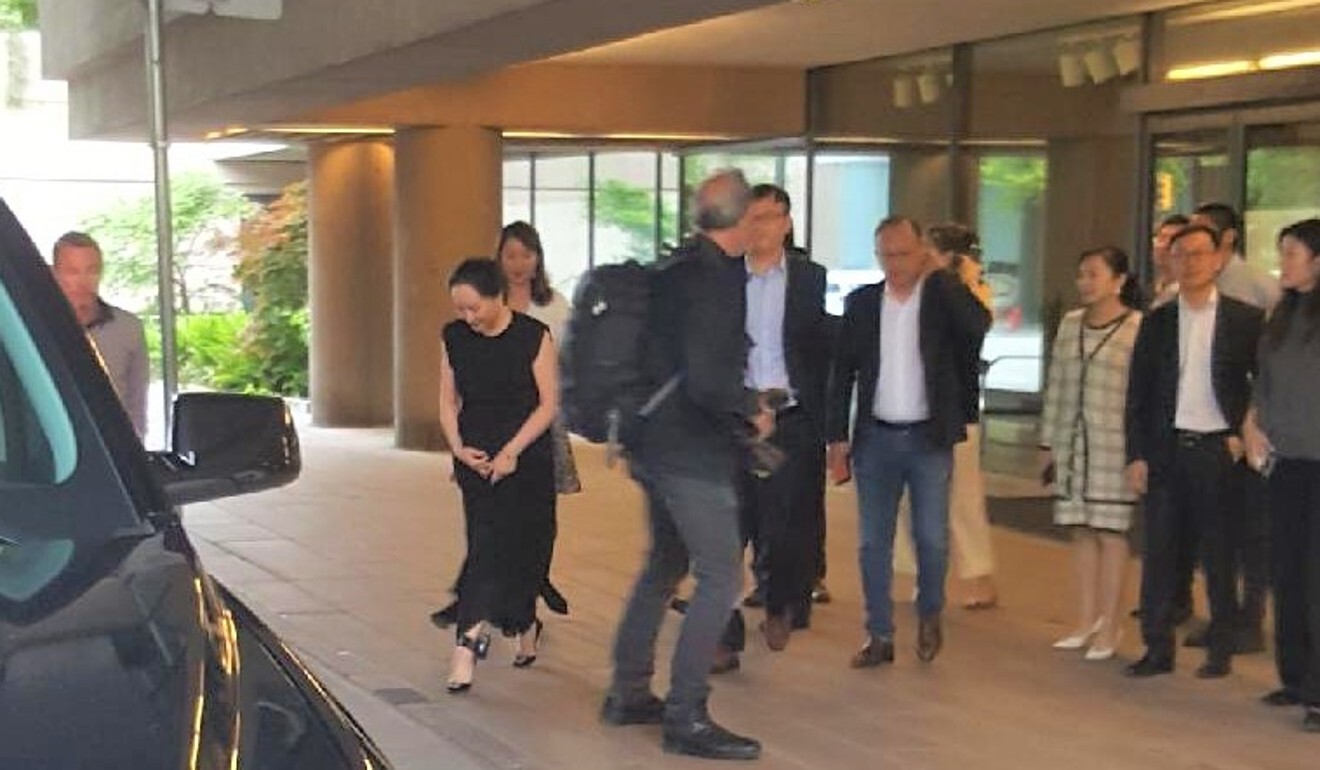A judge in Vancouver will decide on Wednesday if the US extradition bid for the Huawei executive satisfies the requirement of ‘double criminality’
The case could be dismissed, and Meng free to leave Canada, after 17 months of legal drama that threw China’s relations with Ottawa and Washington into turmoil
Ian Young in Vancouver 27 May, 2020 SCMP

Meng Wanzhou (third from right) poses for photos with supporters on the steps of the BC Supreme Court on Saturday. Photo: SCMP
VIDEOS AT END
Huawei executive Meng Wanzhou stood on the steps of the British Columbia Supreme Court complex on Saturday, posing for pictures with supporters.
They included about a dozen Huawei employees and friends who have attended Meng’s court appearances since her arrest at Vancouver’s airport on December 1, 2018.
But if Meng gets her way, she will not be seeing much more of the building that served as the backdrop.
On Wednesday, judge Heather Holmes will deliver a ruling that could set free Huawei’s chief financial officer, ending her 17-month court battle
Meng, who is currently under partial house arrest on C$10 million (US$7.2 million) bail, was arrested by Canadian police at the request of US authorities, who want her extradited to face fraud charges in New York.

Meng Wanzhou (left) meets supporters outside the BC Supreme Court on Saturday. Her GPS monitoring bracelet can be seen on her ankle. Photo: SCMP
The arrest triggered a major international incident, as China’s government accused Washington of using Meng as a political pawn. Two Canadians, Michael Kovrig and Michael Spavor, were promptly arrested in China on charges of espionage that were widely seen in Canada as retaliation and hostage-taking.
But for all the intrigue, Meng’s fate could hinge on the ruling by Holmes, BC’s associate chief justice, who will decide whether the case meets the Canadian extradition standard of “double criminality”.
At Saturday’s photo shoot in downtown Vancouver, Meng’s private security guards shooed off onlookers, said a source who provided the South China Morning Post with photos of the occasion. The guards are officially tasked with preventing Meng from escaping, but also serve as her bodyguards and drivers.
“We thought it was odd, that one of these security guards was asking us to move on … he was polite about it, but he still asked us to leave,” said the source.
Smiling and with her arm casually draped around her companions, Meng’s demeanour gave no indication of the stakes in this week’s ruling.
It will be a key moment in a battle that has poured petrol on the US-China trade conflagration and upended China-Canada relations.
What is double criminality?
Double criminality is a benchmark for extradition cases in Canada – suspects must be accused of something that would constitute a crime in Canada as well as in the country seeking the suspect’s extradition.
Meng is accused by US prosecutors of bank fraud, in which she allegedly deceived a HSBC executive in Hong Kong about Huawei Technologies’ business in Iran, in breach of US sanctions against the Middle Eastern country.
Her lawyers say the accusations fail the test of double criminality because they amount to an attempt to “dress up” a case of breaching US sanctions, which is not a crime in Canada.
The Canadian government lawyers representing US interests in the case say the charge is fraud, a crime in Canada.
Why is Wednesday’s ruling important?
If Holmes rules the case fails the test of double criminality, Meng will be set free – unless there is an appeal and a request for her detention to be extended pending its outcome.
If Holmes rules double criminality has been satisfied, the extradition case will continue, with Meng’s lawyers arguing for her release on other grounds.
These include that the case has been tainted by political interference, such as US President Donald Trump’s assertion that he might intervene if it suited US economic interests. They have also said Meng’s Canadian rights were violated by her treatment at Vancouver’s airport, when border agents searched her belongings and questioned her in what her lawyers say was a “covert criminal investigation”.
Court appearances have been scheduled until October, pending Wednesday’s ruling. An appeal process could last years.
]
In the background is the long-delayed decision by Canada’s government whether to allow Huawei to participate in its 5G telecoms networks. Canada is part of the so-called “five eyes” group of intelligence allies (along with the US, Britain, Australia and New Zealand), so its decision on whether to let Huawei into its 5G networks will be a matter of intense scrutiny at the highest levels. Critics say Huawei poses a security risk.
When will the ruling be made?
The decision will be announced at about 11.30am PST Wednesday, Vancouver time, which is 2.30am Thursday Hong Kong time.
Lawyers for Meng and the opposing Canadian government counsel will be informed of the ruling earlier, at 9am. At 10am, the lawyers will be allowed to inform Meng, the Canadian government and US authorities of the decision, but are sworn to keep it secret until 11.30am, when a hearing will be held at the court complex and the written reasons for judgment will be released on the court’s website.
Whether Meng attends the hearing will depend on the decision.
What do the Chinese and Canadian governments say?
Canada’s Prime Minister Justin Trudeau said this week regarding the case that “Canada has an independent judicial system that functions without interference or override by politicians”, adding that “China doesn’t work quite the same way.”
However, China’s foreign ministry this week urged Canada to free Meng in order to safeguard ties with Beijing. “The Canadian side should immediately correct its mistake, release Meng and ensure her safe return to China at an early date, so as to avoid any continuous harm to China-Canada relations,” spokesman Zhao Lijian said on Tuesday.

Meng Wanzhou (second from right) poses with supporters outside the BC Supreme Court on Saturday. Photo: SCMP
US authorities have not commented on the case recently. On January 10, 2019, Trump said he might intervene if it was for the good of the US in its trade war with China, or it was in the interests of national security. “I would certainly intervene if I thought it was necessary,” he told Reuters.
What is Meng’s current status?
Meng is living in the exclusive Vancouver neighbourhood of Shaughnessy in a C$13.6 million mansion that is one of two homes she owns in the city.
She is allowed to roam around the city, subject to an 11pm-6am curfew. She must wear an electronic monitoring bracelet to ensure she does not leave an area of about 260 square kilometres, and does not go near the city’s airport.
Meng is guarded by employees of Lion’s Gate Risk Management, who have been empowered by the BC Supreme Court to prevent her escaping. Meng pays Lion’s Gate, under the terms of her C$10 million bail.
When will the ruling be made?
The decision will be announced at about 11.30am PST Wednesday, Vancouver time, which is 2.30am Thursday Hong Kong time.
Lawyers for Meng and the opposing Canadian government counsel will be informed of the ruling earlier, at 9am. At 10am, the lawyers will be allowed to inform Meng, the Canadian government and US authorities of the decision, but are sworn to keep it secret until 11.30am, when a hearing will be held at the court complex and the written reasons for judgment will be released on the court’s website.
Whether Meng attends the hearing will depend on the decision.
What do the Chinese and Canadian governments say?
Canada’s Prime Minister Justin Trudeau said this week regarding the case that “Canada has an independent judicial system that functions without interference or override by politicians”, adding that “China doesn’t work quite the same way.”
However, China’s foreign ministry this week urged Canada to free Meng in order to safeguard ties with Beijing. “The Canadian side should immediately correct its mistake, release Meng and ensure her safe return to China at an early date, so as to avoid any continuous harm to China-Canada relations,” spokesman Zhao Lijian said on Tuesday.

Meng Wanzhou (second from right) poses with supporters outside the BC Supreme Court on Saturday. Photo: SCMP
US authorities have not commented on the case recently. On January 10, 2019, Trump said he might intervene if it was for the good of the US in its trade war with China, or it was in the interests of national security. “I would certainly intervene if I thought it was necessary,” he told Reuters.
What is Meng’s current status?
Meng is living in the exclusive Vancouver neighbourhood of Shaughnessy in a C$13.6 million mansion that is one of two homes she owns in the city.
She is allowed to roam around the city, subject to an 11pm-6am curfew. She must wear an electronic monitoring bracelet to ensure she does not leave an area of about 260 square kilometres, and does not go near the city’s airport.
Meng is guarded by employees of Lion’s Gate Risk Management, who have been empowered by the BC Supreme Court to prevent her escaping. Meng pays Lion’s Gate, under the terms of her C$10 million bail.

No comments:
Post a Comment